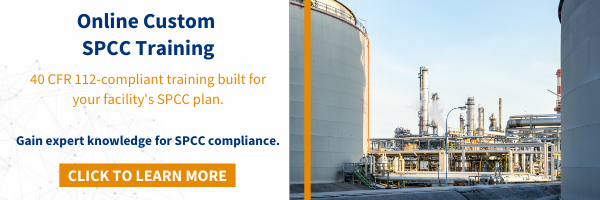The Spill Prevention, Control, and Countermeasure (SPCC) Rule is a key environmental compliance factor for facilities that store, use, or process oil. The aim of the SPCC Rule is to prevent oil spills into navigable waters and adjacent shorelines.
Here are answers to ten frequently asked questions about SPCC compliance to help you understand better how to apply the Rule to your facility.
Looking for more SPCC support? Contact us today!
10 SPCC FAQs
1. What is the SPCC Rule?
The SPCC Rule is aimed at preventing oil spills from reaching any navigable waters or adjoining shorelines. It is codified under 40 CFR Part 112 and enforced by the United States Environmental Protection Agency (US EPA).
The SPCC Rule sets requirements for oil storage and handling at facilities. These include oil spill prevention actions and the maintenance of an SPCC plan.
2. What is an SPCC Plan?
In order to meet SPCC Rule requirements, regulated facilities must have an SPCC plan.
The SPCC plan explains how a facility is safely storing oil, how they are equipped to deal with a possible spill or leak, and how oil is handled.
Every facility’s SPCC plan is unique because it is created to apply to the specific situation of each facility.
3. Who does the SPCC Rule apply to?
The SPCC Rule applies to facilities with a total aboveground oil storage capacity greater than 1,320 gallons or an underground oil storage capacity greater than 42,000 gallons and in locations where discharged oil has a potential to reach navigable waters or adjoining shorelines.
Any facility that stores, processes, or uses oil may be subject to the SPCC Rule. These could include oil production facilities, manufacturing facilities, power generating stations, and waste treatment facilities, among others.
Oil transportation activities are not usually covered by the SPCC Rule (like pipeline systems or oil transported by rail) unless that oil is only being transported within the confines of a facility.
It’s also important to note that the SPCC Rule applies to all types of oil, including petroleum-based oils, vegetable oils, and animal fats.
4. Are there any exemptions to SPCC requirements?
While there are no exemptions to the SPCC Rule, you may have oil containers at your facility that are exempt from counting toward your total oil storage capacity.
These include storage containers with a capacity less than 55-gallons, permanently closed containers, motive power containers, hot-mix asphalt and containers, heating oil used only at a single-family residence, pesticide application equipment and containers, and underground storage tanks subject to 40 CFR 280 or 281 technical requirements.

5. What are the key components of an SPCC plan?
Your SPCC plan will cover your oil inventory (storage containers and equipment), as well as how you plan to prevent oil spills, control spills that may happen, and clean up an oil spill.
SPCC plans need to explain the operating procedures at the facility, the control measure in place (such as secondary containment), detail inspections and maintenance, and provide a facility site plan (if not a Tier I Qualified Facility).
Detailed recordkeeping is required for your SPCC plan, including records of facility inspections and employee training.
6. How do I get my SPCC plan certified?
If your facility is not a Tier I Qualified Facility, your SPCC plan will need to be certified by a Professional Engineer (PE). They or their agent will need to visit your facility, review all the SPCC plan elements, evaluate the need for impracticability and environmental equivalence, and certify to the adequacy of the procedures, controls, inspections, and the accuracy of the inventory.
Some facilities may be eligible to self-certify their plans if they meet the Tier I Qualified Facility criteria. This is for facilities with aboveground oil storage of 10,000 gallons or less and that have not an oil spill exceeding 1,000 gallons or two oil spills exceeding 42 gallons in the last 12 months.
7. How often does an SPCC plan need to be reviewed and updated?
SPCC plans will need to be reviewed and updated at a minimum of every five years. However, whenever there are changes to the oil storage, containers, or facility operations and procedures or contacts, the plan should be reviewed and updated accordingly.
8. Do I need to provide employee training?
Yes, annual employee training or briefings are required. Employees will need to be trained on oil handling, oil spill response procedures, their roles during a spill event, and SPCC plan contents.
9. Are inspections required with my SPCC plan?
Performing regular inspections of your oil storage containers is crucial for preventing oil discharge events. These inspections will help you identify potential issues, such as leaks or corrosion, overfill, and liquid level equipment malfunctions, so you can take corrective action before they turn into a spill.
Your SPCC plan will require that you perform certain inspections, evaluations, and tests at regular intervals according to industry standards or otherwise PE-certified inspection procedures and schedules.
10. What should I do if I have an oil spill or discharge?
Oil spills and oil discharges are not one in the same. Oil spills may be localized to the facility. But if your facility has an oil spill that reaches navigable waters or adjoining shorelines, this may be an oil discharge and you may need to report to the National Response Center as soon as it is discovered. You may also be required to report the discharge to the EPA and to state and local authorities.
Your response will be guided by the procedures detailed in your SPCC plan for control and countermeasures. This is why it is so critical that you have a strong plan in place and that your employees have been trained accordingly.
Find SPCC Plan Solutions with Tetra Tech
Understanding your SPCC requirements and having a strong SPCC plan is crucial for oil spill prevention and for clean-up should any oil spills occur. However, putting an SPCC plan into place can be complex since SPCC plans must be so uniquely tailored to your facility.
If you need help creating your SPCC plan, reviewing your current plan, or training your employees, contact Tetra Tech’s experts today. We can help you create your custom SPCC plan for your facility and support you in determining solutions to the various requirements.






